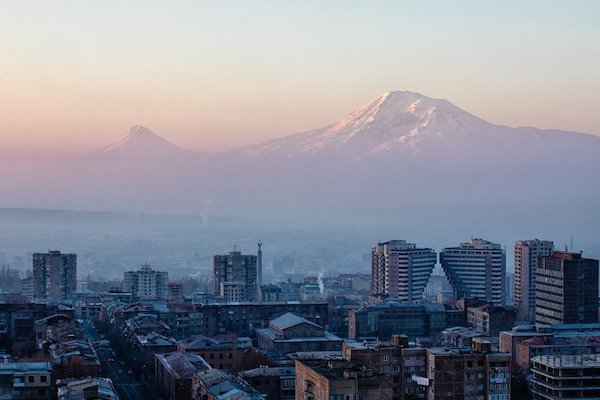The First Words of My Book
“The hills weren’t always there.”
This is a truth I first learned from Ms. Frizzle and her Magic School Bus, my little elementary self looking a book about a class who goes into a volcano to learn about plate tectonics and how the earth is actually CHANGING ALL THE TIME. Like, from the inside.
Did you forget that? I forget it all the time. I go to the grocery store and pick my kids up from school and stay up too late watching my shows, and I totally forget that the earth is alive under our feet. That it always has been. And that it was growing and changing way before a human being stood up and made a meal or held a baby to their breast or certainly well before there were any jobs to do or lists to finish or achievements to achieve.
As you may know, I came out a few days before I left for Peace Corps in Armenia. What followed? Two years in a place that held me as I grew and changed, all that heat inside me finally finding relief and finding purpose.
On Instagram this week I shared the first words of my book. I’ll do even more here. I’d like to share with you the first page:
Mount Ararat behind Armenia’s capital, Yerevan
The hills weren’t always there. At some point the earth pinched itself. The earth drew up its skin, felt the pressure of years and years and years of being alone, generating heat from the inside. Sometimes it burst or seeped, molten. Sometimes the earth pressed it’s edges so hard against each other that mountains rose from nothing. Sometimes it opened just enough to let out hot air.
The scar of the Rocky Mountains runs across America, and the deep gash of the Dead Sea is one of Earth’s most implosive memories. The Caucuses are borderless and stretch from Russia to Azerbaijan, Earth reaching into the dark abyss of the universe with each peak.
For a long time the earth has pushed jagged edges into the sky along Armenia’s southern border with Iran, mountainous walls that tower over a flimsy barbed wire fence that runs along the village of Agarak. Southern Armenia is squeezed into a narrow valley of crags, holding towns like Kapan and Goris against the stone on both sides. You can finally start to stretch out your arms over the canyon near Tatev, and by Yeghegnadzor you nearly forget about the mountains the roads seem so flat.
The capital, Yerevan, sits in the desert, low and hot in the summer, barely snow-dusted in the winter. And from that city you can see the mountain the whole country longs for. There, across the closed border with Turkey, in Western Armenia, Ararat rises above a haze of clouds, unreachable. Yervantsis look out from cinder block high rises drinking coffee from tiny cups, often remembering Noah, imagining his boat resting on Ararat’s peak.
Traveling north toward a town I might call mine, Armenia spreads out and rises back up in to the mountains. Village after village can be counted at night by the lights running up each slope, merging with the stars. Mountain passes snake up and down, hour by hour until the final mountain pass. And there, coming down switch backs you can see Stepanavan nestled up to the edge of cliff. Laying down next to the canyon, people who live there wait for things to grow, in their fields, in their town, in their bank accounts, in their memories, in their futures.
The gratitude I have when I think of Stepanavan feels so much larger than the two years I was there. I am grateful for every person who has lived there who created a place that held me like a chrysalis. I’m grateful for every Armenian who has persisted in loving the country so well that its gifts were abundant when I landed, a soft, exuberant young man. I’m grateful to the daisies in my favorite field northwest of the city and to the tall trees that shaded my favorite hike into the mountains. And I feel grateful that my story is one of billions held by a planet that continues to change.
That’s, in part, what those first words mean to me. And more… I suppose that’s part of making a book. That the book itself and all of the words in it will take on new meaning as time passes and as you, my friend, pick it up to read.
Update: These are no longer the first words of my book. This instead, is a piece of writing that ended up on the cutting room floor while editing Leap. So, there you have it. More change as the book continued to evolve. And what a gift to be able to share these words with you here.
